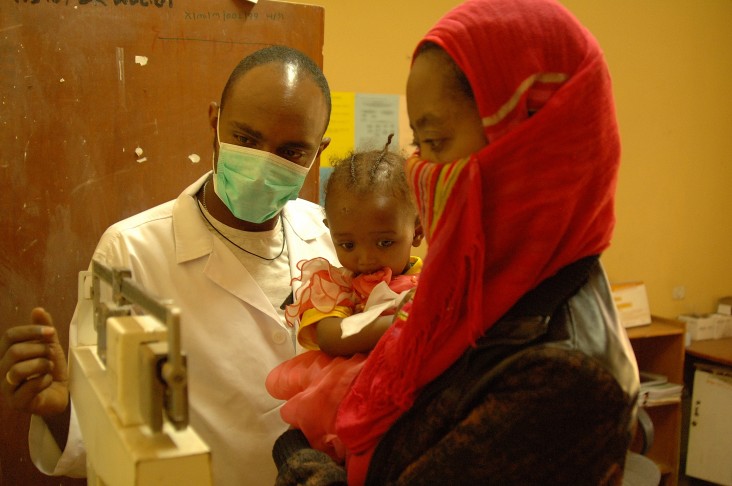Speeches Shim

Indemen aderachu
It is my great pleasure to be here today on behalf of USAID to participate in the 12th National TB Research Annual Conference and commemorate World TB Day.
Tuberculosis, or TB, continues to be a major global health concern and one of the top 10 causes of deaths worldwide. The World Health Organization reported that during 2015, 10.4 million people became ill with TB and 1.8 million died from the disease! This indicates that globally, TB has surpassed HIV/AIDS as a major cause of mortality.
Ethiopia, is one of the 30 high TB, TB/HIV and multi-drug resistant, or MDR-TB burden countries in the world with more than 126,000 reported cases in 2016. And despite achieving a treatment success rate of more than 90 percent, 30 percent of cases remain undetected.
The U.S. Government continues to support Ethiopia to achieve its goal of eliminating TB by 2050 through key activities funded by USAID and the U.S. President’s Emergency Plan for AIDS Relief, also known as PEPFAR. USAID’s TB focused activities—Challenge TB, HEAL TB and the Private Health Sector Program—continue their support in expanding access to TB diagnostic and treatment services, managing drug-resistant TB, integrating TB/HIV activities to provide optimal diagnostic and treatment services for co-infected patients, and strengthening laboratory and commodities logistics capacity and human resources for health to ensure a strong health system.
With assistance from the donor community, the Government of Ethiopia has made major progress in the fight against MDR-TB and TB/HIV. While the U.S. Government supports routine TB program as well, our strategic advantage is working with you to fight MDR-TB. As many of you know, MDR-TB is much more expensive to treat and it will be devastating to the Ethiopian healthcare system if the problem is not contained.
In the past, Ethiopians with MDR-TB could only be treated in Addis Ababa. But now, Ethiopians suffering from MDR-TB can be treated in 45 treatment centers throughout the country, which are linked to more than 650 follow-up centers. Because of this, treatment success for MDR-TB patients is above the global average.
One example of this is Birhan, who lives in North Wollo. After being diagnosed, he was able to receive proper treatment at his local Woldia Hospital. The hospital also asked him to bring his family in for screening. As a result, his sisters Mekdes and Almaz were diagnosed with drug resistant TB. Mekdes is in her 17th month of treatment and Almaz is in her 15th month, both with good improvement.
The challenge of finding all cases, coupled with the growing threat of drug-resistant TB, indicates the need for bold policies, enhanced efforts, new diagnostic tools, new drugs and shorter treatment regimens, innovative implementation strategies for case finding and management. The role of research to generate evidence to further optimize existing strategies and tools to meet these challenges becomes crucial.
Ethiopia, through its well established research partnership forum, the Tuberculosis Research Advisory Committee, or TRAC, has been exemplary in achieving successful results in enhancing research capacity and generating local evidence. The committee has been vital in coordinating and expanding research efforts, including disseminating the evidence generated through relevant forums.
The successful deliberation of this National TB Research Annual Conference for the 12th time is testament to the effectiveness of the committee and its partnership under the leadership of the Ministry of Health. The significant increase in the publication and presentation of research papers from Ethiopia in major international journals and symposia are clear examples of the successful work being done.
We at USAID, and our partners, take pride in this partnership and a sustained commitment to enhance program-based operational research capacity in the country. We applaud your efforts and look forward to the important lessons that will be drawn from ongoing and future research to inform policy for effective interventions to End TB. On behalf of USAID, I reaffirm our continued support to build upon what we have accomplished thus far.
I would like to thank and express my appreciation to our partners that have been instrumental in our efforts to meet our goal of enhanced program performance and program-based operational research capacity. I would like to thank the Ministry of Health, the TB Research Advisory Committee, and this year’s conference hosts, the Addis Ababa City Administration Health Bureau, Addis Ababa University, and St. Peter’s Hospital, for inviting USAID to make this keynote address and renew our strong partnership with you all to combat TB.
In commemoration of World TB Day, I would like to acknowledge the achievements Ethiopia has made in combatting the TB epidemic and praise your continued efforts. Finally, I wish you a spirit of knowledge sharing and partnership during this important national conference. I also wish you success in translating the evidence you have generated into action that will be instrumental to combating TB. I am confident that if we continue to work together, we will meet the World Health Organization goal to End TB here in Ethiopia by 2035!
Thank you and amasegenalehu.
See also
USAID Remarks 12th National TB Conference {PDF, 177kb]

Comment
Make a general inquiry or suggest an improvement.